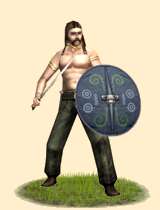Bagaudas (Celtic Shortswordsmen)
 |
Weapons | Defence | Mental | ||||||
|---|---|---|---|---|---|---|---|---|---|
| Primary | Secondary | Armour: | 1 | Morale: | 11 | ||||
| Type: | spear | sword | Shield: | 2 | Discipline: | impetuous | |||
| Attack: | 6 | 12 | Skill: | 12 | Training: | untrained | |||
| Charge: | 6 | 6 | Recruitment | Other | |||||
| Lethality: | 1 | 0.1 | Soldiers: | 50 | Hit Points: | 1 | |||
| Range: | 47.3 | 0 | Cost: | 1254 | Mass: | 1.05 | |||
| Ammo: | 3 | 0 | Upkeep: | 314 | |||||
| Turns: | 1 | ||||||||

Bagaudas are shortswordsmen from the tribe of the Venetii. They are specially adept at springing ambushes but are impetuous and extremely vulnerable at range.
Impetuous
Very Hardy
Can Hide in Long Grass
Bagaudas (Bah-gow-dahs; "Guerilla Fighters") are shortswordsmen from the tribe of the Venetii. The shortsword is a common weapon, essentially a very long knife or dagger, and used by hunters, and carried by many as a form of self defense. Warriors using shortswords are not generally very well trained, if at all. However, they are readily available, cheap, and have a good charge. They are extremely vulnerable at range.
Historically, the Celts generally favored spears and shortswords for young or inexperienced soldiers. These warriors, with shortswords, were not necessarily that high up in society; the swords were of debatable quality. Many may not even have fought in battle before, just being hunters or young boys called in to fight, or have chosen to go and fight. Light swordsmen in Celtic society were fairly common, and necessary, often, as a bridge between light and medium infantry, when medium infantry was unavailable. They were increasingly more common during the Roman conquests, as the professional armies with longswordsmen had either been bought by the Romans, or turned on one another, leaving the only defense to these young warriors.